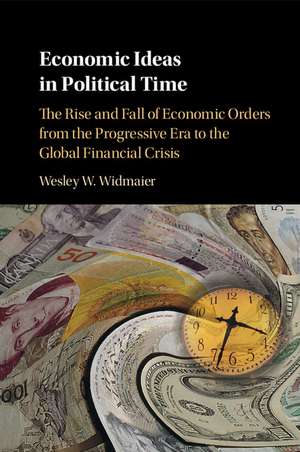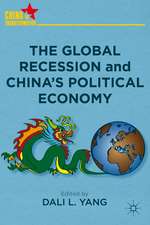Economic Ideas in Political Time: The Rise and Fall of Economic Orders from the Progressive Era to the Global Financial Crisis
Autor Wesley W. Widmaieren Limba Engleză Paperback – 2 noi 2016
| Toate formatele și edițiile | Preț | Express |
|---|---|---|
| Paperback (1) | 278.50 lei 6-8 săpt. | |
| Cambridge University Press – 2 noi 2016 | 278.50 lei 6-8 săpt. | |
| Hardback (1) | 684.16 lei 6-8 săpt. | |
| Cambridge University Press – 13 iul 2016 | 684.16 lei 6-8 săpt. |
Preț: 278.50 lei
Nou
Puncte Express: 418
Preț estimativ în valută:
53.32€ • 55.42$ • 44.20£
53.32€ • 55.42$ • 44.20£
Carte tipărită la comandă
Livrare economică 05-19 februarie 25
Preluare comenzi: 021 569.72.76
Specificații
ISBN-13: 9781316604571
ISBN-10: 1316604578
Pagini: 274
Dimensiuni: 150 x 230 x 15 mm
Greutate: 0.37 kg
Editura: Cambridge University Press
Colecția Cambridge University Press
Locul publicării:Cambridge, United Kingdom
ISBN-10: 1316604578
Pagini: 274
Dimensiuni: 150 x 230 x 15 mm
Greutate: 0.37 kg
Editura: Cambridge University Press
Colecția Cambridge University Press
Locul publicării:Cambridge, United Kingdom
Cuprins
Part I. Theoretical and Historical Foundations: 1. Economic ideas in political time: construction, conversion, and crisis; 2. The construction, conversion, and collapse of the progressive order; Part II. The Construction, Conversion, and Collapse of the Keynesian Order: 3. Constructing the Keynesian order: breaking finance and boosting labor; 4. Converting the Keynesian order: toward the neoclassical synthesis; 5. Constructing the Great Stagflation: from accommodation to transformation; Part III. The Construction, Conversion, and Collapse of the Neoliberal Order: 6. Constructing the neoliberal order: breaking labor and boosting finance; 7. Converting the neoliberal order: toward the New Keynesianism; 8. Constructing the Global Financial Crisis: from accommodation to iteration; Part IV. Conclusions: 9. Theoretical, historical and policy implications; Bibliography; Index.
Notă biografică
Descriere
This book argues that intellectual stability causes recurrent market instability, tracing crises from the Great Crash to the Global Financial Crisis.

















